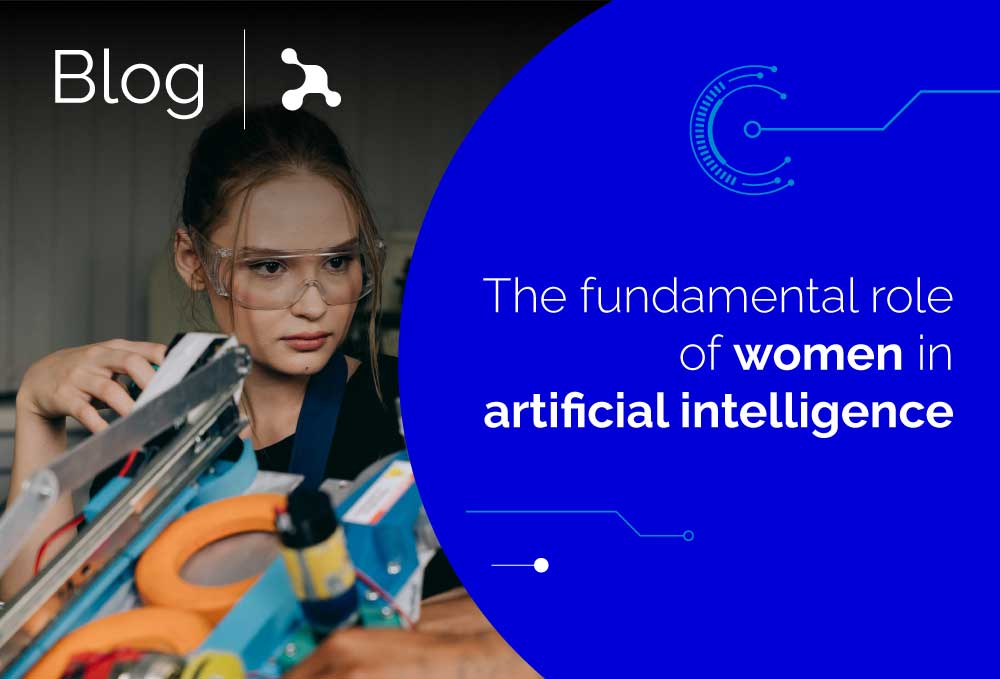On International Women’s Day
It is essential to reflect on and highlight the crucial role that women play in the field of artificial intelligence, one of the most innovative and transformative areas of modern technology. Throughout the history of AI, women have not only been key participants in its development but also pioneers who have opened doors for future generations in this space. This evolution has made women in artificial intelligence a key topic in the technology sector.
The Evolution of Artificial Intelligence
Artificial intelligence, whose purpose is to create systems capable of performing tasks that previously required human intervention—such as learning, perceiving, and making decisions—has evolved thanks to the contributions of visionary women. From the early research in the 1950s and 1960s to the most current applications, women’s contributions have been fundamental in shaping the future of this technology in diverse areas such as medicine, education, ethics, and human-computer interaction.
The Impact of Diversity on Innovation
Diverse Perspectives and Creativity
One of the most significant aspects of including women in AI is how this diversity of perspectives enriches innovation. When women hold key roles in the design, development, and implementation of AI technologies, new possibilities open up to address problems creatively and effectively. Gender diversity not only fosters creativity but also promotes ethics and fairness in decision-making within this field.
By integrating women into the creation of intelligent systems, the social implications of the developed technologies can be better considered. Women tend to be more sensitive to the potential social and ethical consequences of AI, including privacy, algorithmic biases, and security. These perspectives, often overlooked in predominantly male environments, are crucial to ensuring that AI benefits all of society without leaving anyone behind.
Women Who Have Transformed Artificial Intelligence
Fei-Fei Li
Fei-Fei Li is one of the most influential figures in computer vision and deep learning. A Professor of Computer Science at Stanford University, she has led pioneering research in image recognition. Her work is crucial for the development of AI in applications such as autonomous vehicles and medicine. Additionally, Fei-Fei has been an active advocate for more inclusive AI, promoting data diversity to prevent biases in machine learning models.
Rosalind Picard
Founder of the Affective Computing Group at MIT, Rosalind Picard has revolutionized the field of affective computing, which seeks to create systems capable of recognizing and responding to human emotions. Her work has had a significant impact on human-computer interaction, particularly in areas such as mental health, where technology can be used to provide personalized emotional support to patients.
Daphne Koller
Co-founder of Coursera, Daphne Koller has combined her expertise in machine learning with artificial intelligence applied to medicine. Her work has improved disease diagnosis and treatment through the analysis of large volumes of medical data. Additionally, Daphne has democratized education by offering accessible online courses, using AI to enhance the learning process.
Kate Crawford
Kate Crawford, Principal Researcher at Microsoft Research and co-founder of the AI Now Institute at New York University, is one of the most influential voices on the social and ethical impacts of AI. Her work has focused on algorithmic biases and the need for ethical regulation in the development of emerging technologies. Crawford has been a pioneer in highlighting the importance of transparency in AI and how it can influence society in unexpected ways.
Cynthia Breazeal
Renowned for her work in designing social robots, Cynthia Breazeal has transformed the way we interact with technology. Founder of the company Jibo, her research at the MIT Media Lab on human-robot interaction has opened new possibilities in fields such as education, personal assistance, and customer service. Her innovations have demonstrated how robots can have a positive impact on people’s daily lives.
The Importance of Advancing Women’s Inclusion and Empowerment in AI
It is vital to recognize that, despite significant progress, women remain underrepresented in science and technology in general, and especially in the field of AI. However, the growing number of women leading research teams, companies, and organizations dedicated to AI is a testament to the fact that gender barriers are beginning to break down, although much remains to be done.
On this day, we not only celebrate and recognize the women who have made history in AI, but we also commit to continuing the work toward gender equity in this field. Promoting an inclusive environment where women can develop professionally and have access to the same opportunities as men is key to ensuring that AI develops in a fair and ethical manner.
This is especially important in a world where artificial intelligence is taking a leading role in almost every aspect of daily life and business ecosystems, from healthcare to governmental decision-making.
The impact of women in artificial intelligence has not only been fundamental but will continue to be crucial for the development of AI that benefits all of humanity equitably. Their work, passion, and dedication inspire us to build a fairer, more inclusive, and, of course, more innovative future.
We join in commemorating and exalting the role of women in society!




